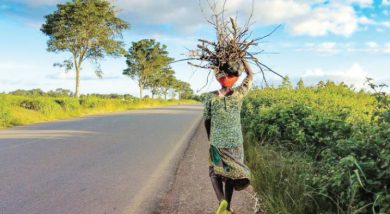Self-actualised widows
She casually proclaims her transformation while cradling her red chitenje as she drags a life-size bag of washing powder from her rather modest-looking hut.
“I am a living proof of a life completely transformed. A life changed for the better,” says Florence Chimenya, a 42-year-old widowed mother of five.
The fact that just last year her life was full of misery and desperation is inconceivable yet accurate.
“If it weren’t for Mlumikizi my family would still be destitute,” she says with a sincere smile as she pulls a twin bag towards her daughter who can neither speak nor hear.

Chimenya hails from Katunga Village, Traditional Authority Kanduku in Mwanza, which is among the four districts where Christian Aid linked communities under the Social Protection to Resilience Project dubbed Mlumikizi.
She bears witness to how her farming efforts are now nearly effortless while her small business of selling scones and washing powder are money spinners.
“In the past, I could fail to contribute to our village bank for two months and had only shares worth K5 000. But now I have well over K120 000 worth of shares,” Chimenya says.
She explains that before the linkages her household was on the breadline.
“We lacked food and I could not afford to pay school fees for my children. How could one look after a household of six people through piecework?” Chimenya says.
The European Union (EU)-funded programme worth 4.5 million euros (over K3.6 billion) was aimed at contributing to the reduction of food and nutrition insecurity in Mwanza, Neno, Mzimba and Chikwawa districts.
It was being implemented in partnership with Care Malawi, Synod of Livingstonia Development Programme and Eagles Relief and Development Programme.
If Mlumikizi was devoid of challenges, then it would not be worth the paper its success is inscribed on, says Care Malawi programme manager for Mwanza and Neno districts, Deliwe Mataka.
“The linkages started on a shaky note as would-be-recipients were looked down upon by beneficiaries of existing social cash transfer programmes.
“But after sensitisation, they grasped the concept of using already established structures and initiatives to benefit other ultra-poor and labour-constrained households,” she says.
Targeting a total of 29 500 Social Cash Transfer Programme beneficiary households in the targeted districts, cash top up beneficiaries used the money to purchase crop and livestock production inputs, food and other assets.
About 3 500 beneficiaries were linked to and took part in important livelihoods systems such as crop production, energy efficient stove-making, bee-keeping and marketing cooperatives as well as other important value chains.
The beneficiary households can now save more than before and in turn afford decent shelter.
Just like Chimenya, Agness Matope, 42, who at first glance does not seem to amount to anything, is a success story.
Matope, also a widowed mother of five, reaped untold benefits from the Mlumikizi intervention.
“Care Malawi provided us with vegetable and legume seed which we are benefiting from. Now I’m reaping in three to four bales.
“We are equipped with modern farming methods such as the usage of organic manure. I was able to acquire livestock –three pigs and two goats plus animal feed from the Mtukula Pakhomo Project,” she explains.
The feats attained by Matope illustrate how locals were empowered by both the Social Cash Transfer Programme and the community linkages.
“I have been a beneficiary since 2015. My household is never short of food. I’m able to provide my children with school fees, uniforms and other learning materials.
“I have already bought iron sheets through Mtukula Pakhomo and I’m planning to build a modern house by next year through Mlumikizi benefits,” she says.
Christian Aid climate smart agriculture specialist Wanangwa Moyo-Master sheds light on the background of Mlumikizi.
“The Synod of Livingstonia was our implementing partner for Mzimba North whereas Care Malawi handles Mzimba South, Mwanza and Neno. Chikwawa District is under Eagles Relief and Development Programme,” she says.
Moyo-Master says the project was a food and nutrition security instrument targeting Mtukula Pakhomo beneficiaries.
“It had three components which are disaster management, modern farming and environmental preservation as well as economic empowerment.”
In the farming component, beneficiaries were empowered with knowledge on how to make organic manure and use it instead of chemical fertilisers.
The manure was made from decomposing maize stalks which also retain moisture.
“Beneficiaries were also taught how to construct drains to keep water for irrigation and are discouraged from ridging because ridges are often 75cm apart which is a complete waste of planting space,” Moyo-Master says.
The Mlumikizi project started in November, 2017 and ended last month and the success stories registered are symbolic of a well-executed plan.
Malawi might be a poverty-ravaged nation, but all hope is not lost.
As Chimenya says, “I will stop at nothing to inspire other vulnerable individuals and households to explore and exploit the interventions which have propelled me to self-actualisation.”





